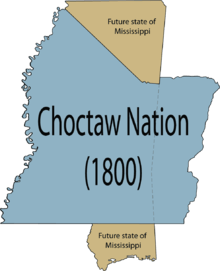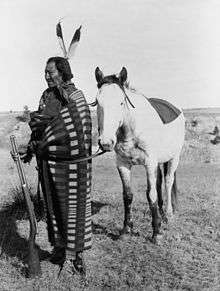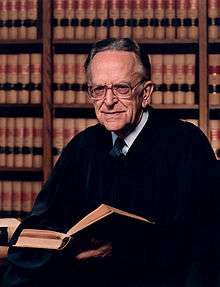United States v. John (1978)
| United States v. John | |||||||
|---|---|---|---|---|---|---|---|
|
| |||||||
| Argued April 19, 1978 Decided June 23, 1978 | |||||||
| Full case name | United States v. Smith John and Harry Smith John; Smith John and Harry Smith John v. State of Mississippi | ||||||
| Citations |
98 S.Ct. 2541, 57 L.Ed.2d 489 | ||||||
| Prior history | United States v. John, 560 F.2d 1202 (5th Cir. Miss. 1977); John v. State, 347 So.2d 959 (Miss. 1977) | ||||||
| Subsequent history | United States v. John, 587 F.2d 683 (5th Cir. 1979) | ||||||
| Holding | |||||||
| Held that lands designated as a reservation in Mississippi are "Indian country" as defined by statute, and under the Major Crimes Act, the State has no jurisdiction to try an Indian for crimes covered by that act. Fifth Circuit Court reversed and remanded, Mississippi Supreme Court reversed. | |||||||
| Court membership | |||||||
| |||||||
| Case opinions | |||||||
| Majority | Blackmun, J., joined by Burger, C.J., Brennan, Stewart, White, Marshall, Powell, Rehnquist, and Stevens, JJ. | ||||||
| Laws applied | |||||||
| 18 U.S.C. §§ 1151–1153 | |||||||
United States v. John, 437 U.S. 634 (1978), was a case in which the Supreme Court of the United States held that lands designated as a reservation in Mississippi are "Indian country" as defined by statute, and under the Major Crimes Act, the State has no jurisdiction to try an Indian for crimes covered by that act.[1]
Background
History

The Choctaw lived in Mississippi since before the Revolutionary War and made a treaty with the United States in 1786.[fn 1] By the time Mississippi became a state in 1817, the Choctaws still held three-quarters of the land in the state, but there was pressure to open these lands for white settlement. Federal policy at that time was to encourage the removal of the Choctaw to Indian Territory in present-day Oklahoma. In 1820 and again in 1830, the tribe signed two treaties[fn 2] ceding almost all of their land to the United States.
By 1835, most of the tribe had been removed to the Indian Territory, but many others had stayed in Mississippi.[5] In the 1890s the federal government became aware that not all Choctaws had left, and by 1916, the Bureau of Indian Affairs (BIA) began to set aside moneys to provide for some of the needs of the tribe. In the 1930s, federal policy again changed, with the passage of the Indian Reorganization Act, and in 1939 Congress set aside funds to provide what was to become the Mississippi Band of Choctaw Indians with a reservation.[6] In 1944, the Secretary of the Interior set aside 15,000 acres (6,100 ha; 23 sq mi) as an Indian reservation.[7]
Major Crimes Act

Originally, crimes committed by Indians against Indians were not subject to federal or state jurisdiction, but were handled by tribal law. In 1881, a Brulé Sioux named Crow Dog shot an killed another Indian, Spotted Tail on the Great Sioux Reservation in South Dakota. Crow Dog was tried in federal court for murder, was found guilty, and was sentenced to hang. He petitioned for a writ of habeas corpus to the Supreme Court, and in Ex Parte Crow Dog the Supreme Court found that the federal government did not have jurisdiction to try the case. Crow Dog was ordered released, having made restitution under tribal law to Spotted Tail's family.[fn 3]
In response to Ex Parte Crow Dog, Congress passed the Major Crimes Act in 1885.[9] The Act provided that the federal government had exclusive jurisdiction[fn 4] over certain Indian on Indian crimes[fn 5] when the crimes were committed in "Indian country."[fn 6][13] In 1886, the Act was upheld by the Supreme Court in United States v. Kagama.
Procedural history
In October, 1975, Smith John and his son, Harry Smith John[fn 7] were indicted for assault with intent to commit the murder of Artis Jenkins.[15] All of the parties were Choctaw Indians, and the assault occurred on the reservation. Both John and his son were tried in the Federal District Court and convicted of simple assault.[16] John was sentenced to 90 days in jail and a $300 fine.[17] Subsequent to that trial, John and his son were indicted by a state grand jury in Leake County, Mississippi for aggravated assault, based on the same facts.[18] John objected to state jurisdiction, which was denied, and he was convicted and sentenced to two years in the state prison.[19]
John appealed both convictions. In May, 1997, the Mississippi Supreme Court determined that the Indian title to the land was extinguished under the removal treaties. Under the treaties, the Mississippi Constitution, and Mississippi statutes, Choctaws that remained in the state after removal became citizens of Mississippi and subject to state law. Because of this, the reservation land in Mississippi is not Indian country. Following this ruling, the Fifth Circuit Court came to the same conclusion, and reversed the federal conviction on the grounds that the district court lacked jurisdiction.[20] The United States then appealed to the U.S. Supreme Court, which granted certiorari to hear the cases.
U.S. Supreme Court
Arguments
United States
The United States was represented by H. Bartow Farr III. The United States argued that the land the reservation was on, and on which the crime was committed, was undisputedly land purchased by the federal government and held in trust for the Mississippi Choctaw tribe as an Indian reservation. By the plain text of the statute, this gives the U.S. District Court jurisdiction since the lands were "within the limits of [an] Indian reservation." Even if, for the sake of argument, the United States had relinquished jurisdiction following the Indian Removal Act, Congress has plenary power under the U.S. Constitution's Indian Commerce Clause to alter treaty terms and reassert jurisdiction. Finally, Congress has the right to assert jurisdiction over federal land under the Property Clause of the Constitution.[21]
State of Mississippi
The State of Mississippi was represented by Carl F. Andre. Mississippi argued that the Treaty of Dancing Rabbit Creek ended the federal oversight of Choctaw Indians who remained in the state after 1833. The state claimed that "Mississippi Choctaw citizens did not become a tribe, did not live on a reservation in Indian country, and did not become wards of the federal government as a result of the Indian Reorganization Act (1934) and a proclamation of the Department of Interior (1944)." Since they are not tribal members, the provisions of the Major Crimes Act does not apply, and the state has jurisdiction.[22]
Smith John
John was represented by Richard B. Collins. John argued that Mississippi could not rely on the Treaty of Dancing Rabbit Creek, as the entire treaty, with the exception of the land cessation, had been breached by the government[fn 8] and the superseding treaty of 1855 rendered the 1830 treaty irrelevant.[26]
Amicus Curiae
Amicus curiae briefs were filed in support of John and the United States by the Association on American Indian Affairs and the Mississippi Band of Choctaw Indians. No briefs were filed in support of Mississippi.
Opinion of the Court

Justice Harry Blackmun delivered the opinion of a unanimous court. Blackmun first looked at the language of the statute, and noted that the definition of Indian country included three separate types of land, and reservation land was applicable to this case.[27] The test for determining if land was reservation land was if the land in question “had been validly set apart for the use of the Indians as such, under the superintendence of the Government.”[28] Blackmun observed that Congress declared that the lands were held in trust for the Mississippi Choctaws in 1939, and that this was further clarified in 1944 when the land was declared to be their reservation.[29] The reliance of both Mississippi and the Fifth Circuit that the Treaty of Dancing Rabbit Creek ended the status of the Mississippi Choctaws as Indians whom the federal government was misplaced, as the Indian Commerce Clause still granted Congress the authority to deal with them.[30] Since the land in question is an Indian reservation, § 1153 applies. The federal government has exclusive jurisdiction over the crime in question, and the State of Mississippi is without jurisdiction.[31] Reversed and remanded as to the decision of the Fifth Circuit, and reversed as to the decision of the Mississippi Supreme Court.[32]
Subsequent developments
One of the results of John was likely the basis for the tribe's decision almost a decade later to litigate Mississippi Band of Choctaw Indians v. Holyfield, an Indian adoption case under the Indian Child Welfare Act.[33] That act gave tribal courts exclusive jurisdiction on adoptions where the parents lived on the reservation, but the Mississippi Supreme Court had denied the tribal court's jurisdiction and found for the Holyfields. The tribe took it to the U.S. Supreme Court, probably to resist state encroachment on tribal rights, and won.[34] The decision also has had an effect on other civil issues, such as taxation. In two Supreme Court cases from Oklahoma dealing with state taxation of Indians, the Court referred to its decision in John to declare trust land as being in Indian country where the state had no authority to tax Indians.[35]
See also
Footnotes
- ↑ Treaty of Hopewell.[2]
- ↑ The Treaty of Doak's Stand[3] and the Treaty of Dancing Rabbit Creek.[4]
- ↑ The restitution consisted of $ 600 (or $ 50 in one source), eight ponies, and one blanket.[8]
- ↑ The federal government has exclusive jurisdiction as regards the states, however, the Indian tribes retain concurrent jurisdiction for these offenses.[10]
- ↑ The crimes covered were murder, manslaughter, rape, assault with intent to commit murder, arson, burglary, and larceny.[11]
- ↑ Indian country was defined as all reservation land, all dependent Indian communities, and all Indian allotments.[12]
- ↑ Harry Smith John died on February 18, 1978, and the appeal in regards to him is moot.[14]
- ↑ The treaty promised that the new lands for the tribe would never be part of a state (now part of Oklahoma),[23] the right to land in Mississippi for tribal members that remained (land was never provided),[24] and the closing of the Oklahoma's tribe's roll to Mississippi tribal members in 1906.[25]
References
- ↑ United States v. John, 437 U.S. 634 (1978).
- ↑ Treaty with the Choctaw, Jan. 3, 1786, 7 Stat. 21.
- ↑ Treaty with the Choctaw, Oct. 18, 1820, 7 Stat. 210.
- ↑ Treaty with the Choctaw, Sept. 27, 1830, 7 Stat. 333.
- ↑ Rowland L. Young, Supreme Court Report 64 A.B.A.J. 1419, 1425 (1978).
- ↑ Young, supra at 1425.
- ↑ Young, supra at 1425.
- ↑ George E. Hyde, A Sioux Chronicle 46-66 (1993); George Washington Kingsbury & George Martin Smith, 2 History of the Dakota Territory 1192–1196 (1915).
- ↑ Major Crimes Act of 1835, Mar. 3, 1885, 23 Stat. 385 (codified as amended as 18 U.S.C. § 1151 et seq.
- ↑ M. Brent Leonhard, Returning Washington P.L. 280 Jurisdiction to its Original Consent-Based Grounds 47 Gonz. L. Rev. 663, 678 (2011-2012).
- ↑ 18 U.S.C. § 1151 et seq.
- ↑ 18 U.S.C. § 1151.
- ↑ 18 U.S.C. § 1151 et seq.; Allison M. Dussias, Heeding the Demands of Justice: Justice Blackmun's Indian Law Opinions 71 N.D. L. Rev. 41, 87-88 (1995).
- ↑ John, 437 U.S. at 636 n.1.
- ↑ Young, supra at 1425; Dussias, supra at 88.
- ↑ Dussias, supra at 88.
- ↑ Young, supra at 1425.
- ↑ Young, supra at Dussias, supra at 88.
- ↑ Young, supra at 1425.
- ↑ Young, supra at 1425.
- ↑ Pet'r's Br., available at 1978 WL 207092 (U.S.) (Appellate Brief).
- ↑ Br. of Miss., available at 1978 WL 223443 (U.S.) (Appellate Brief).
- ↑ 2 Indian Affairs: Laws and Treaties 310 (Charles J. Kappler, ed. 1904).
- ↑ Ronald N. Satz, The Mississippi Choctaw: From the Removal Treaty to the Federal Agency After Removal: The Choctaw in Mississippi 3, 22 (Samuel J. Wells & Roseanna Tubby eds. 2004); Kappler, supra at 313.
- ↑ Satz, supra at 20-21.
- ↑ Br. of John, available at 1978 WL 223444 (U.S.) (Appellate Brief).
- ↑ John, 437 U.S. at 648.
- ↑ John, 437 U.S. at 649 (internal citations omitted); Leonhard, supra at 681.
- ↑ John 437 U.S. at 649-50; Young, supra at 1425; Leonhard, supra at 681; Dussias, supra at 88.
- ↑ John, 437 U.S. at 650; Warren Stapleton, Indian Country, Federal Justice: Is the Exercise of Federal Jurisdiction Under the Major Crimes Act Constitutional? 29 Ariz. St. L.J. 337, 340 (1997).
- ↑ Dussias, supra at 88.
- ↑ John 437 U.S. at 654; Young, supra at 1425.
- ↑ Solangel Maldonado, Race, Culture, and Adoption: Lessons from Mississippi Band of Choctaw Indians v. Holyfield 17 Colum. J. Gender & L. 1, 12-14 (2008).
- ↑ Maldonado, supra at 12-14.
- ↑ Judith V. Royster, Decontextualizing Federal Indian Law: The Supreme Court's 1997-98 Term 34 Tulsa L.J. 329, 342 (1999).
External links
- United States v. John, 437 U.S. 634 (1978), courtesy of Findlaw.
- Oral arguments, United States v. John, courtesy of Oyez.
- Opinion announcement, United States v. John, courtesy of Oyez.
